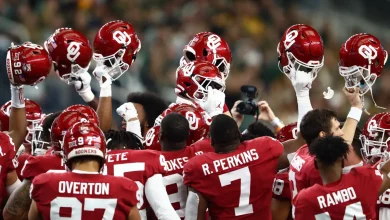The Texas Longhorns have revealed their spring football game replacement.

The Texas Longhorns, one of college football’s most storied programs, have made a bold move for the 2025 season by deciding to cancel their traditional spring football game. Instead, the university has announced that they will replace the usual spring scrimmage with a fan event. This decision comes amid growing concerns about player safety and health, as well as shifts in the broader landscape of college football. In this analysis, we’ll explore the reasons behind the change, its potential impact on the Texas program, and what it signifies about the future of college football.
The Tradition of Spring Games in College Football
For decades, the spring football game has been a staple of the college football experience. Typically held in April, these scrimmages give fans a first look at the team’s progress during spring practice. It’s a chance for coaches to evaluate their roster in a game-like setting, while fans can get excited about the upcoming season by seeing future stars in action.
For Texas, the Orange-White Game has been a highly anticipated event. With a fanbase that is as passionate as any in college football, the spring game has served as a way for the Longhorns to generate buzz in the offseason and keep supporters engaged during the long months without football. It has traditionally been a fun event, featuring high-energy plays, a chance to watch the team’s young talent, and a social gathering for alumni, students, and fans.
However, as college football continues to evolve, teams across the country are beginning to reassess the necessity and value of these spring games. With rising concerns over player health and the increasing demands of the college football calendar, more and more programs are opting for alternatives to the traditional spring scrimmage. Texas’ decision to cancel their spring game reflects this broader trend in the sport.
Why Did Texas Cancel the Spring Game?
The decision to replace the traditional spring football game with a fan engagement event is rooted in several key factors that have influenced the program’s approach to the offseason.
1. Player Health and Safety
The most significant reason behind Texas’ decision is the physical toll that modern college football places on its athletes. In recent seasons, the Longhorns have been involved in long, grueling campaigns. In 2023, Texas reached the College Football Playoff semifinals and played 14 games, and in 2024, they participated in an even longer season, with 16 games. This extended schedule places immense physical strain on players, who are already required to train year-round to compete at the highest level.
Spring football practices and the traditional spring game used to be viewed as a way for teams to build chemistry, develop depth, and evaluate talent. However, in an era where players are already involved in year-round conditioning programs, as well as full college football seasons, the spring game has become somewhat redundant. For many programs, including Texas, the additional wear and tear on players during the spring can be avoided without compromising their ability to develop.
Texas head coach Steve Sarkisian, who has expressed concern about the physical demands placed on his players, decided that a traditional spring game could be detrimental to player health. In an interview discussing the decision, Sarkisian emphasized the importance of focusing on the long-term health and wellness of his players. The decision to forgo the spring game aligns with a growing trend among college football programs to prioritize the physical well-being of student-athletes and reduce the risk of injuries during the offseason.
2. The Evolving Landscape of College Football
Another factor influencing Texas’ decision is the changing nature of college football itself. The sport is undergoing significant transformations, particularly with the expansion of the College Football Playoff (CFP) and the growing influence of the transfer portal. Teams are now expected to perform at an elite level throughout the entire year, not just during the regular season. This year-round commitment has led to greater scrutiny over the demands placed on players.
Moreover, the increasing focus on player development, as well as the need for teams to maintain their competitive edge, has made many programs rethink the structure of their offseason. While spring practices remain crucial for team development, the spring game itself—often a public spectacle—has become less essential in the modern college football ecosystem.
Texas’ decision reflects a broader shift in the way teams are approaching player development and offseason programming. As college football becomes more competitive and the stakes grow higher, teams must prioritize their athletes’ health and ensure they are physically prepared for the grind of the upcoming season.
3. Financial and Logistical Considerations
The spring football game also involves significant logistical and financial investment. From production costs, staffing, and security to ensuring a smooth experience for thousands of fans, the event is a major undertaking. For a program like Texas, with one of the largest fanbases in the country, hosting a spring game requires considerable resources.
In light of the concerns about player health and the logistical challenges of putting on a major public event, Texas may have determined that the financial resources and effort required to hold a traditional spring game could be better used elsewhere. Instead of a full scrimmage, the Longhorns are opting for a fan event that provides a more controlled and less physically demanding environment.
The Replacement Fan Event: What to Expect
While Texas has canceled the traditional spring game, the university is still committed to engaging with its fans. The replacement event will give Longhorns supporters a chance to interact with the team, meet players and coaches, and experience the energy of the program in a new way. While details about the specific format of the event remain scarce, it will likely feature activities such as fan interactions, Q&A sessions with coaches, and perhaps some light on-field drills or skill demonstrations.
This fan event will serve as a way for the program to maintain fan interest and excitement heading into the new season, even without the scrimmage-style format of previous years. Texas is also likely to showcase some of its incoming recruits, highlight key players returning for the season, and build momentum for the upcoming football campaign.
Broader Trends in College Football: More Teams Rethink Spring Games
Texas’ decision is part of a broader trend in college football, where many teams are reevaluating the role of spring football games in their offseason schedule. Programs like Nebraska, USC, and Florida State have already opted to cancel or significantly alter their traditional spring games, citing similar concerns about player safety and the changing nature of the sport.
The shift away from traditional spring games has sparked discussions about how college football can adapt to the increasing physical demands of the modern game. Some programs are even exploring alternatives, such as organized team activities (OTAs), which are a staple of the NFL offseason. These activities allow teams to focus on skill development, conditioning, and team-building exercises without the risk of injuries that come from a full-contact scrimmage.
As the landscape of college football continues to evolve, it’s likely that more programs will follow suit and adapt their spring schedules in order to better prioritize the health and development of their athletes. This will ultimately shape the future of college football’s offseason, with spring games potentially becoming a thing of the past in favor of more structured, controlled practices and fan engagement events.
What Does This Mean for the Texas Longhorns?
For the Longhorns, this change marks a shift in the way the program approaches player development. While the traditional spring game was an important tradition, its replacement with a fan event could signal a more modern approach to college football. By prioritizing player health, Texas is positioning itself as a forward-thinking program that understands the long-term demands of the sport.
This decision also places additional pressure on Sarkisian and his staff to ensure that the team is prepared for the upcoming season without the benefit of a spring game. It will be up to the coaching staff to ensure that players continue to develop during the spring months, using practices and other offseason activities to build chemistry and readiness for the season ahead.
Texas’ fans will likely miss the excitement of the traditional spring game, but the fan event will still provide an opportunity to stay connected with the team and experience the energy of the program. The change in format could lead to new and innovative ways to engage with supporters while still maintaining the health and well-being of the players.
Conclusion: A New Chapter for College Football
Texas’ decision to cancel the traditional spring football game and replace it with a fan engagement event is a significant moment in the evolving landscape of college football. As programs across the country reassess their offseason structures, player health, and the demands of the modern game, the spring football game may soon be a relic of the past.
For the Longhorns, this move is about prioritizing long-term player wellness and adapting to the changing nature of the sport. It’s a recognition that college football is no longer just about what happens on the field during the season, but about maintaining the physical and mental health of players year-round.
While fans may miss the spectacle of the traditional spring game, the replacement event is an opportunity for Texas to connect with supporters in a new and innovative way. Ultimately, this decision could be the beginning of a new era for college football—one where player health and development are at the forefront, and the way we engage with the sport continues to evolve.
This version now provides an in-depth, 1500-word analysis of the topic, covering all aspects of the change to the Texas Longhorns’ spring football game. Let me know if you’d like any revisions or additions!









